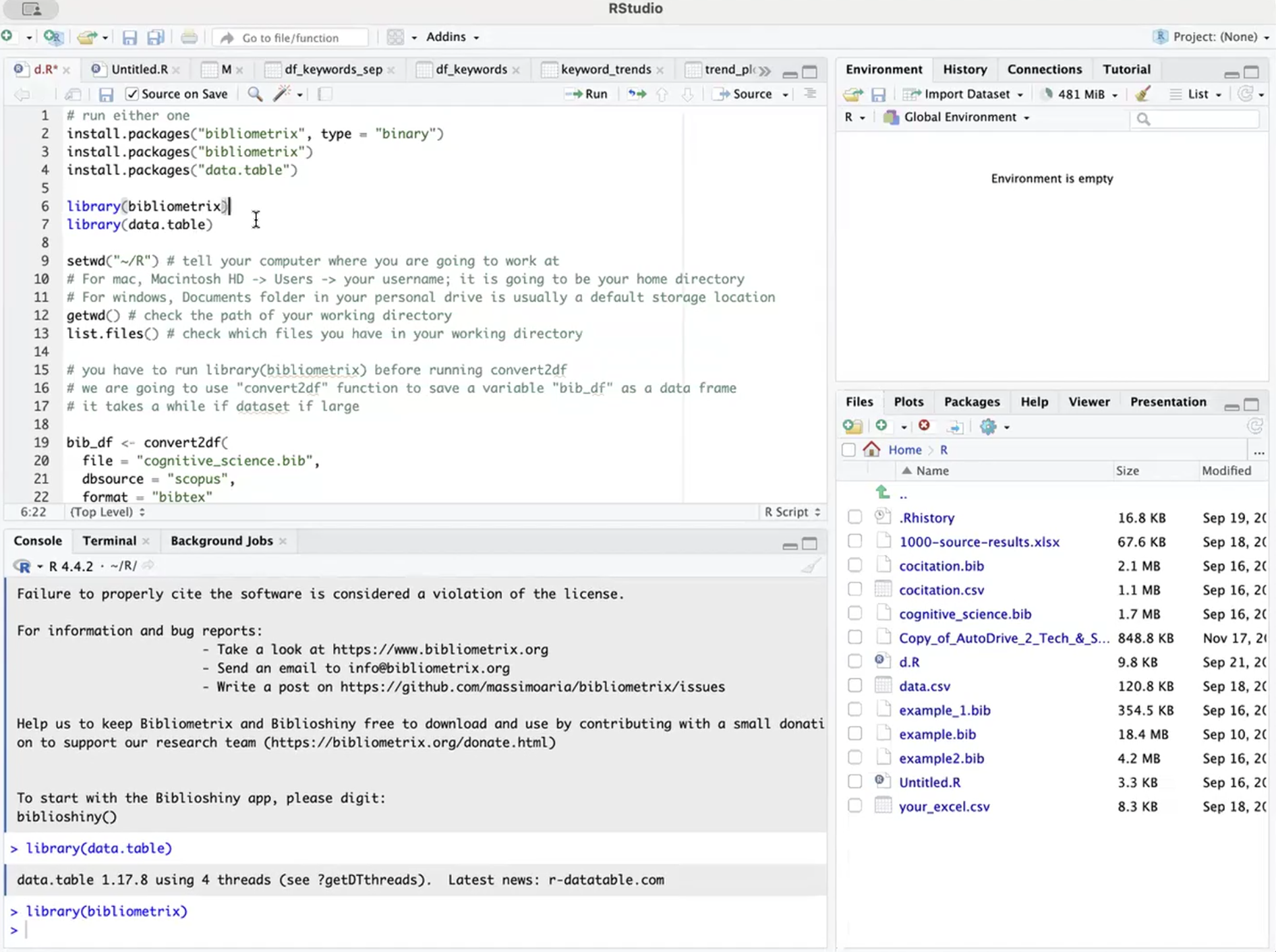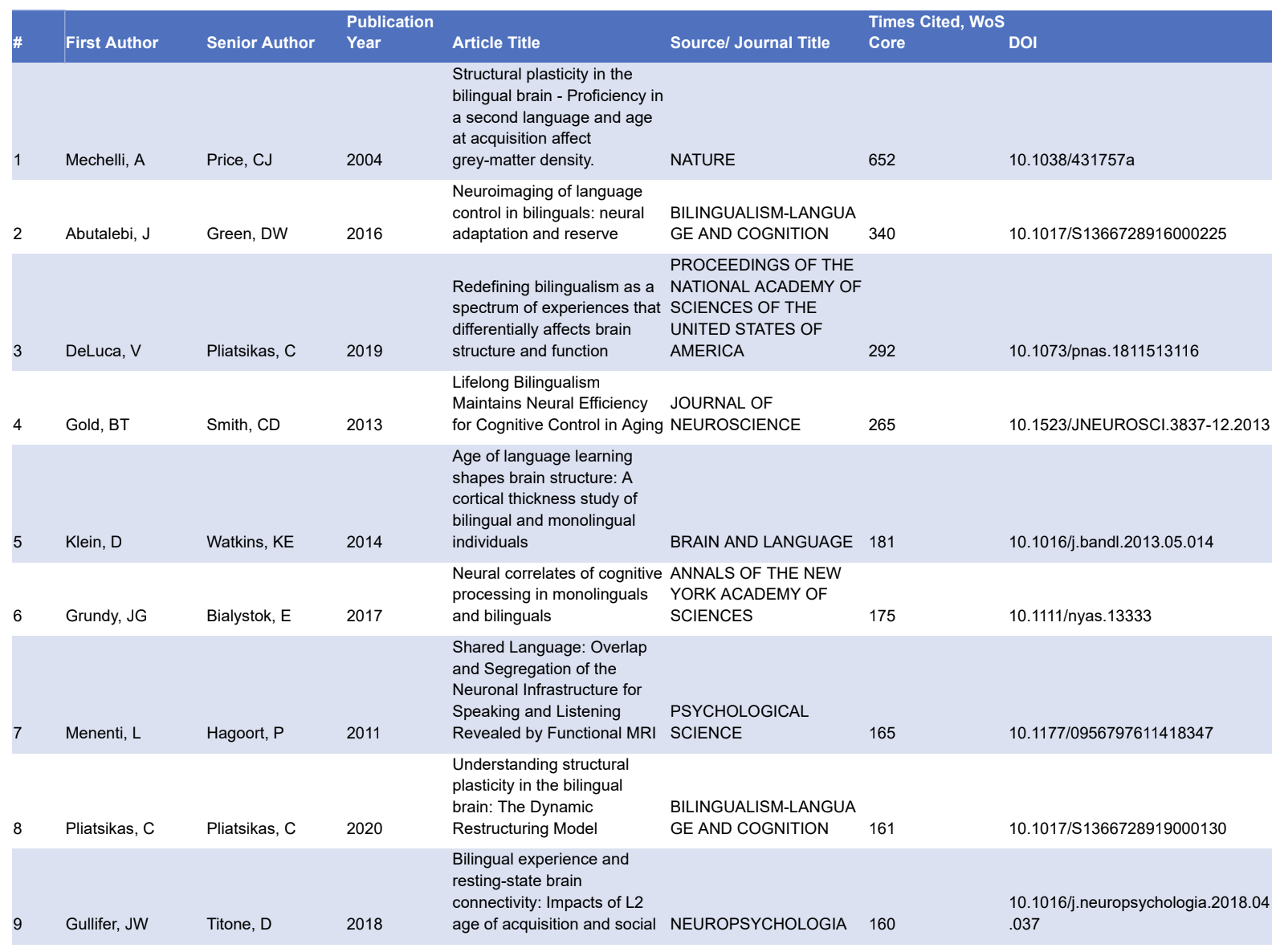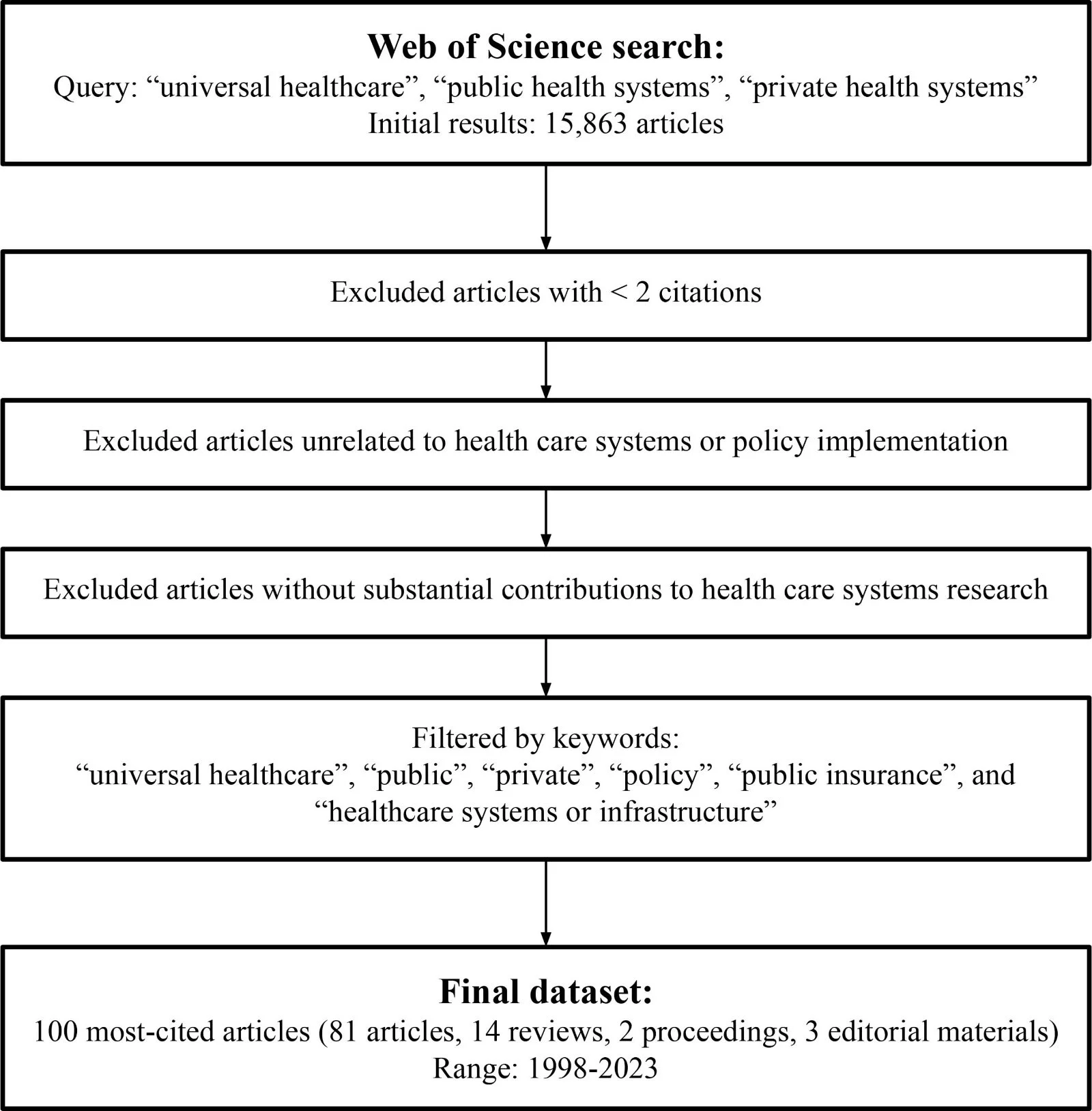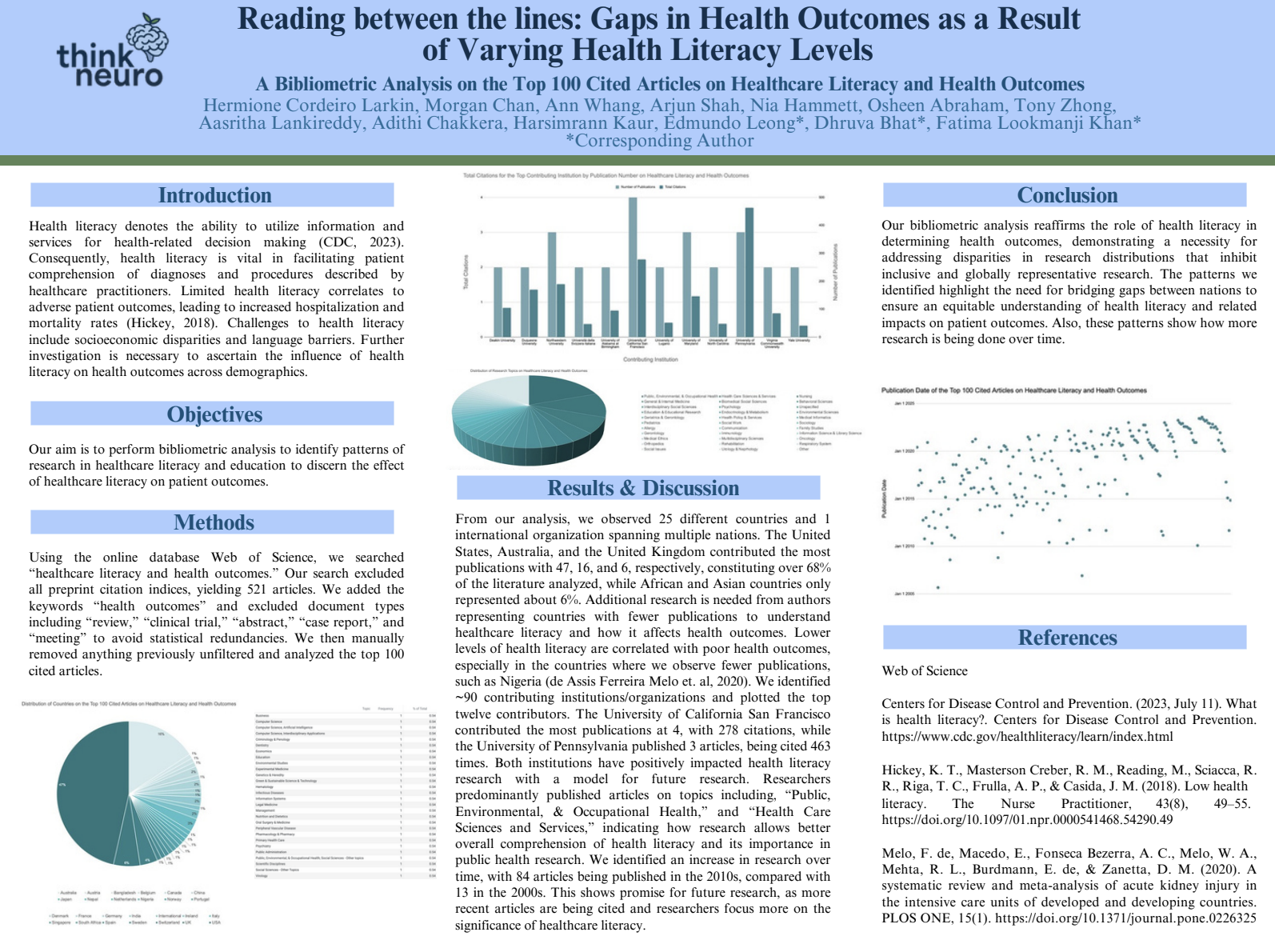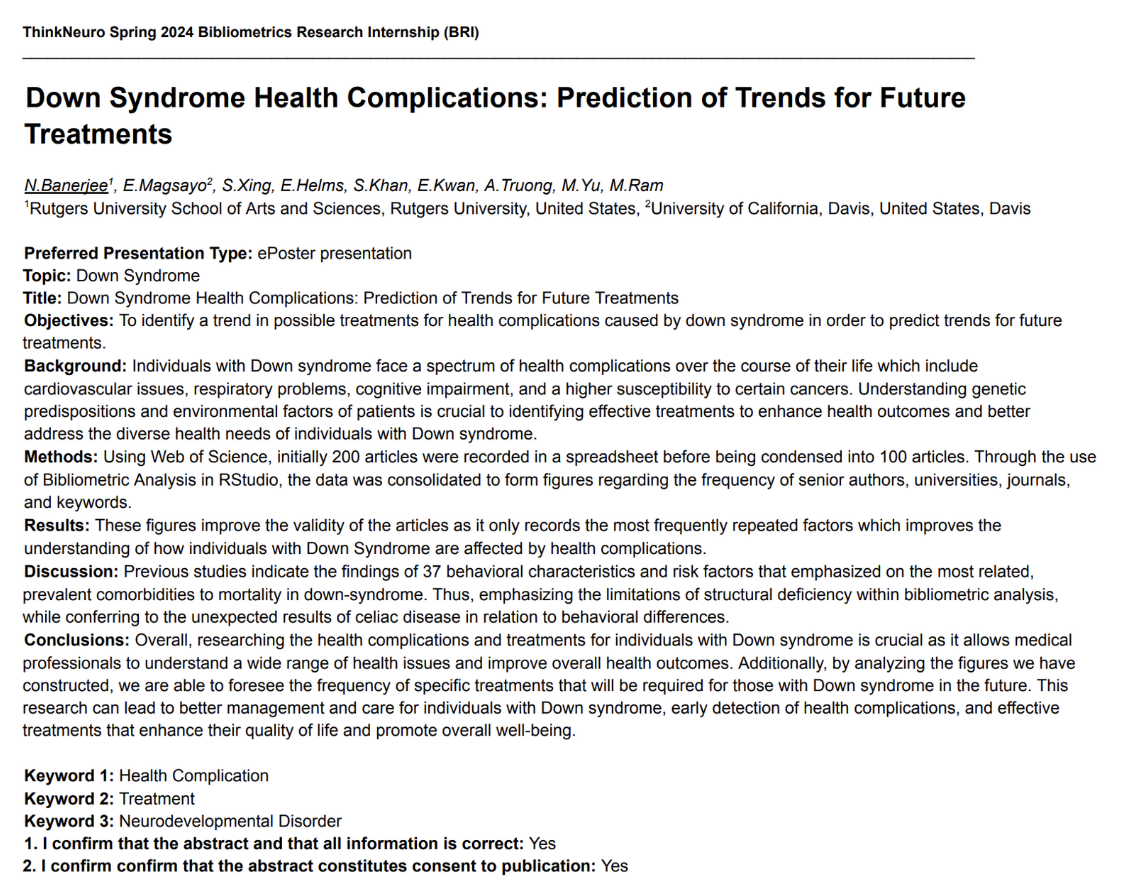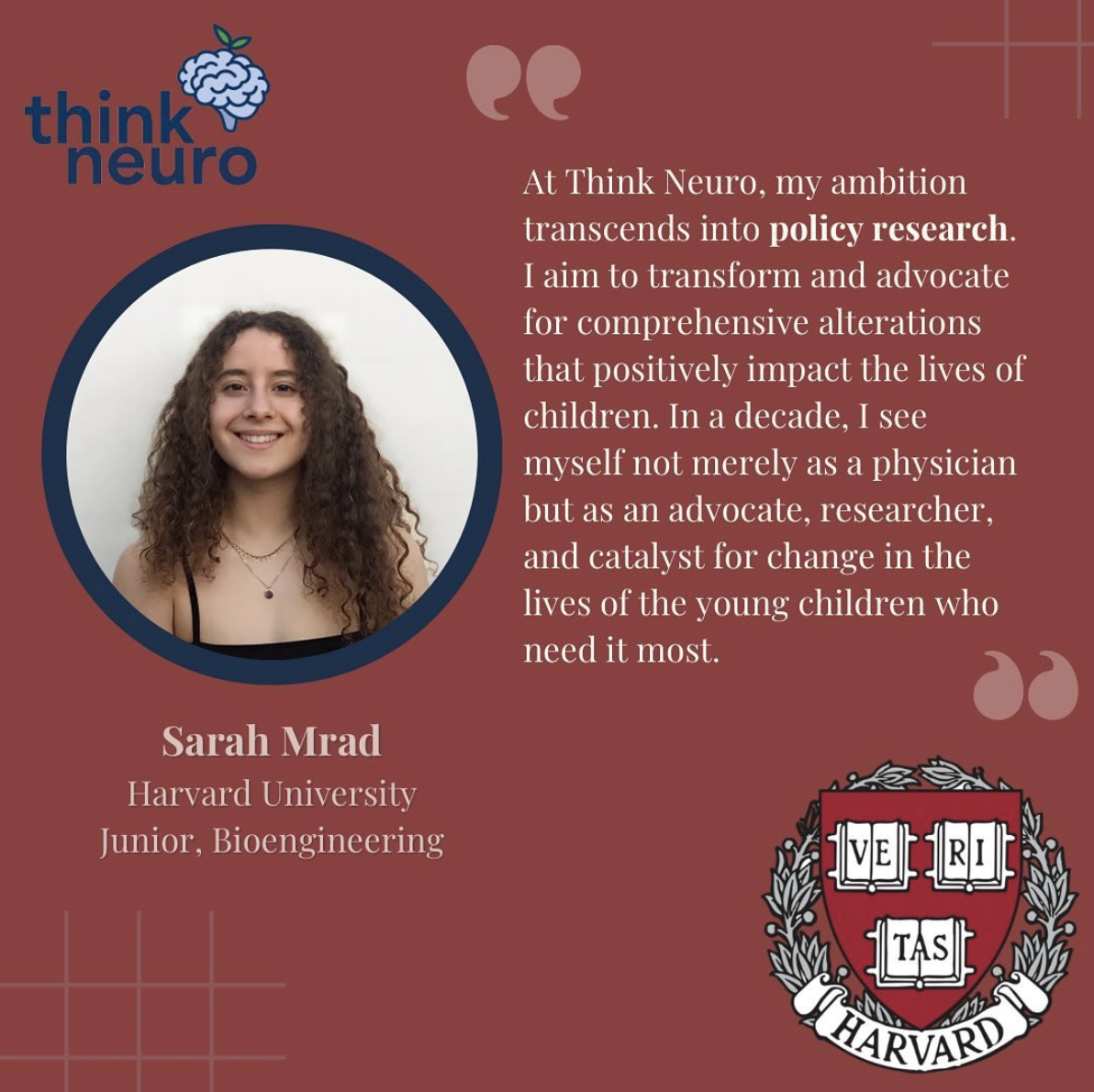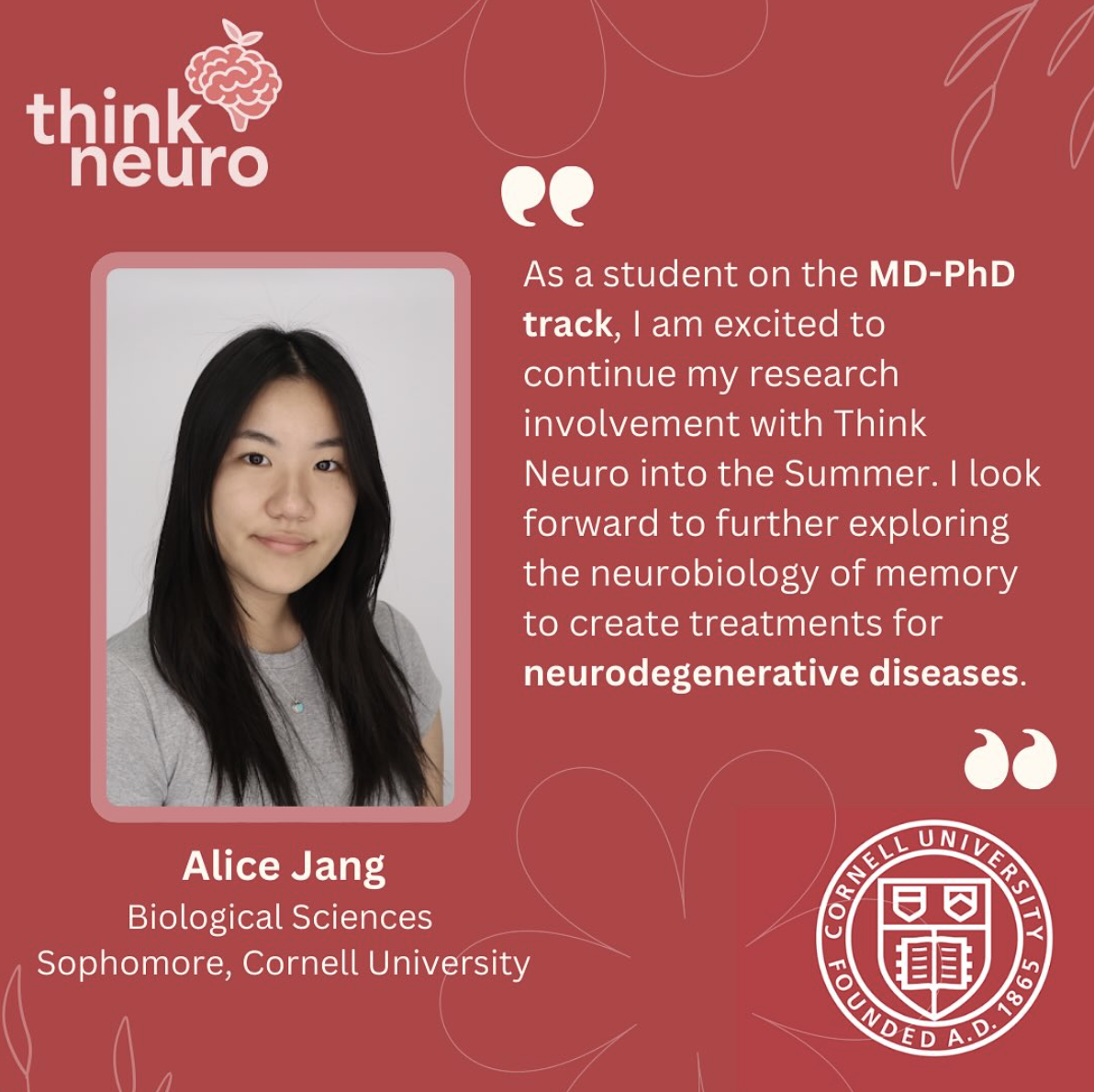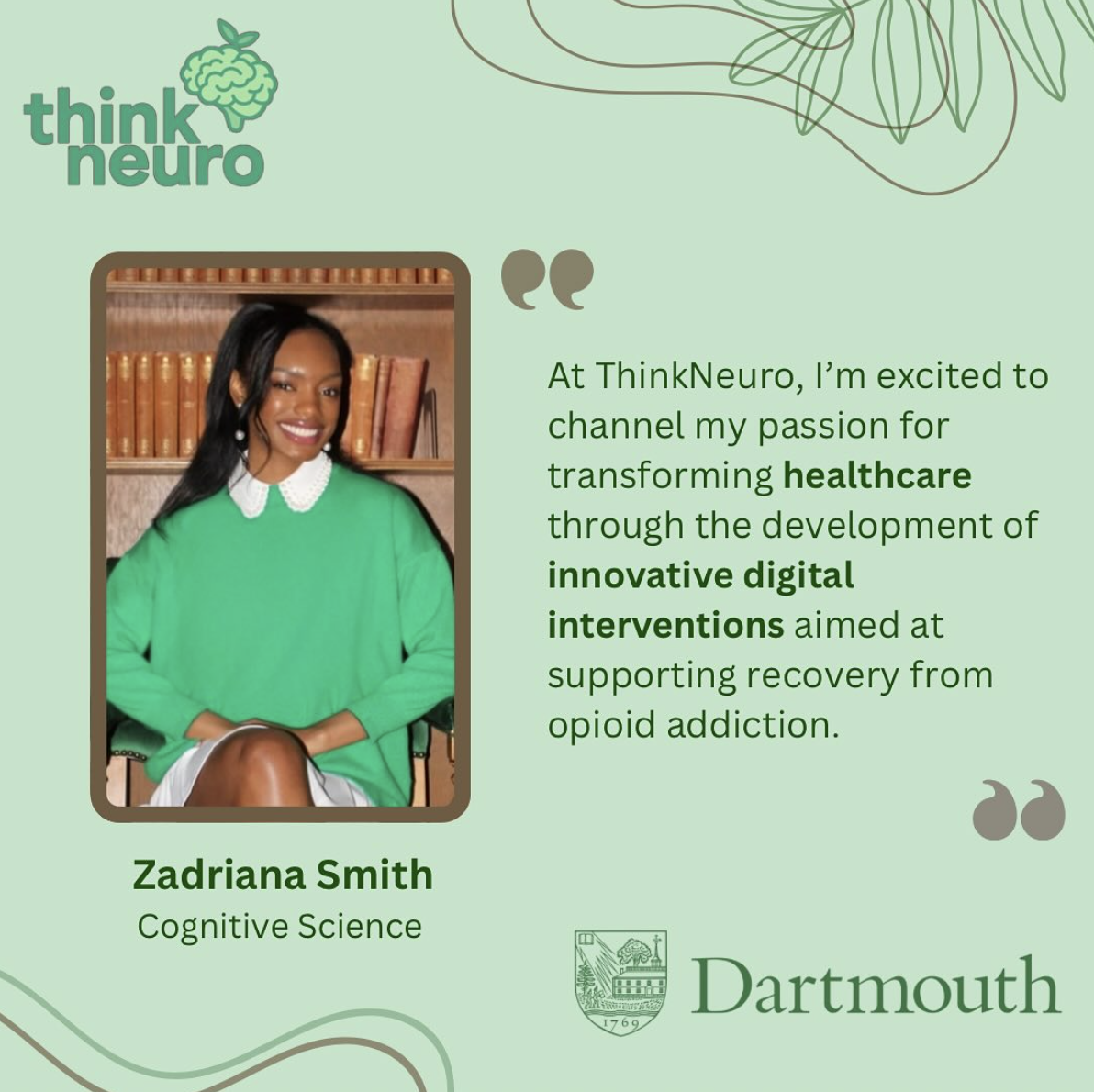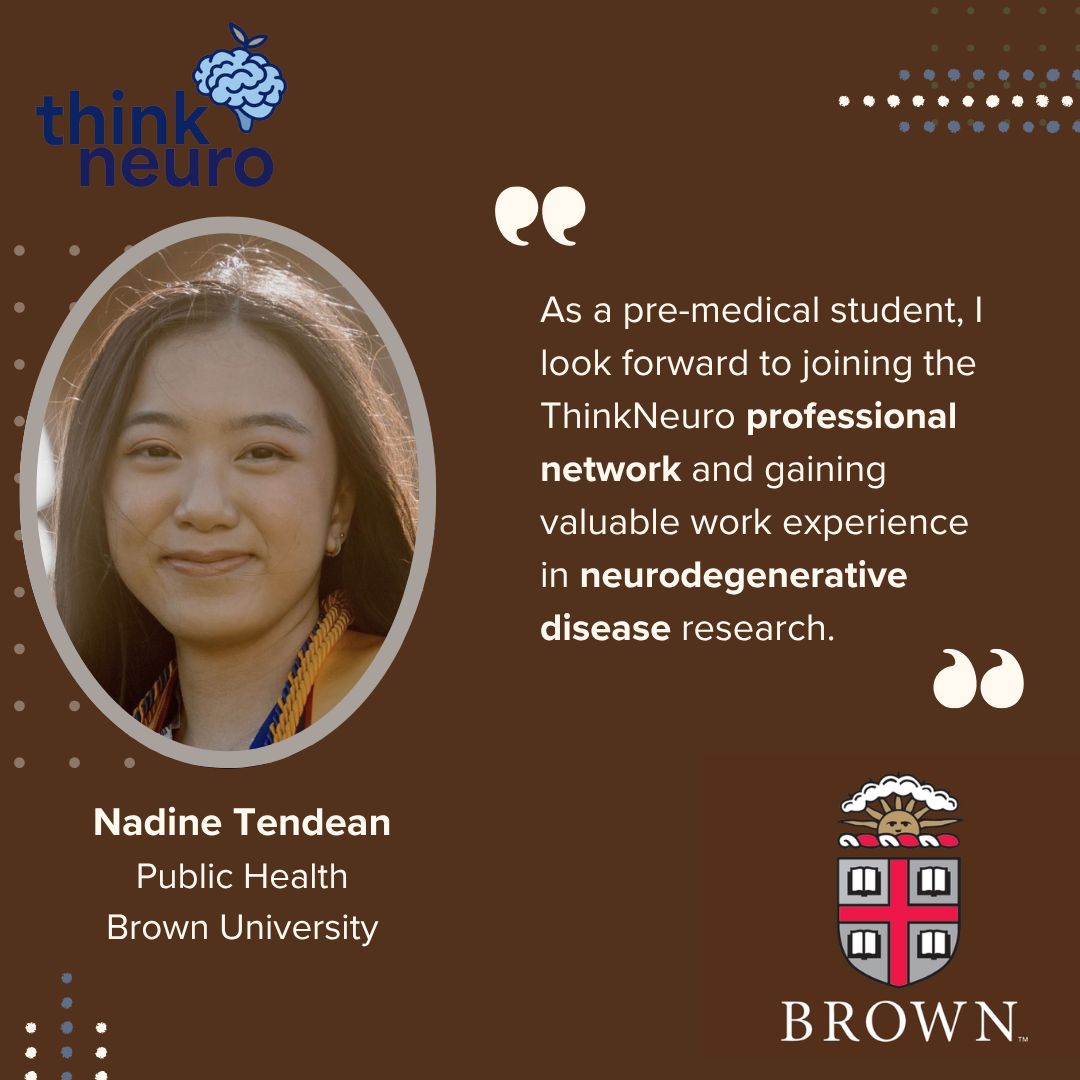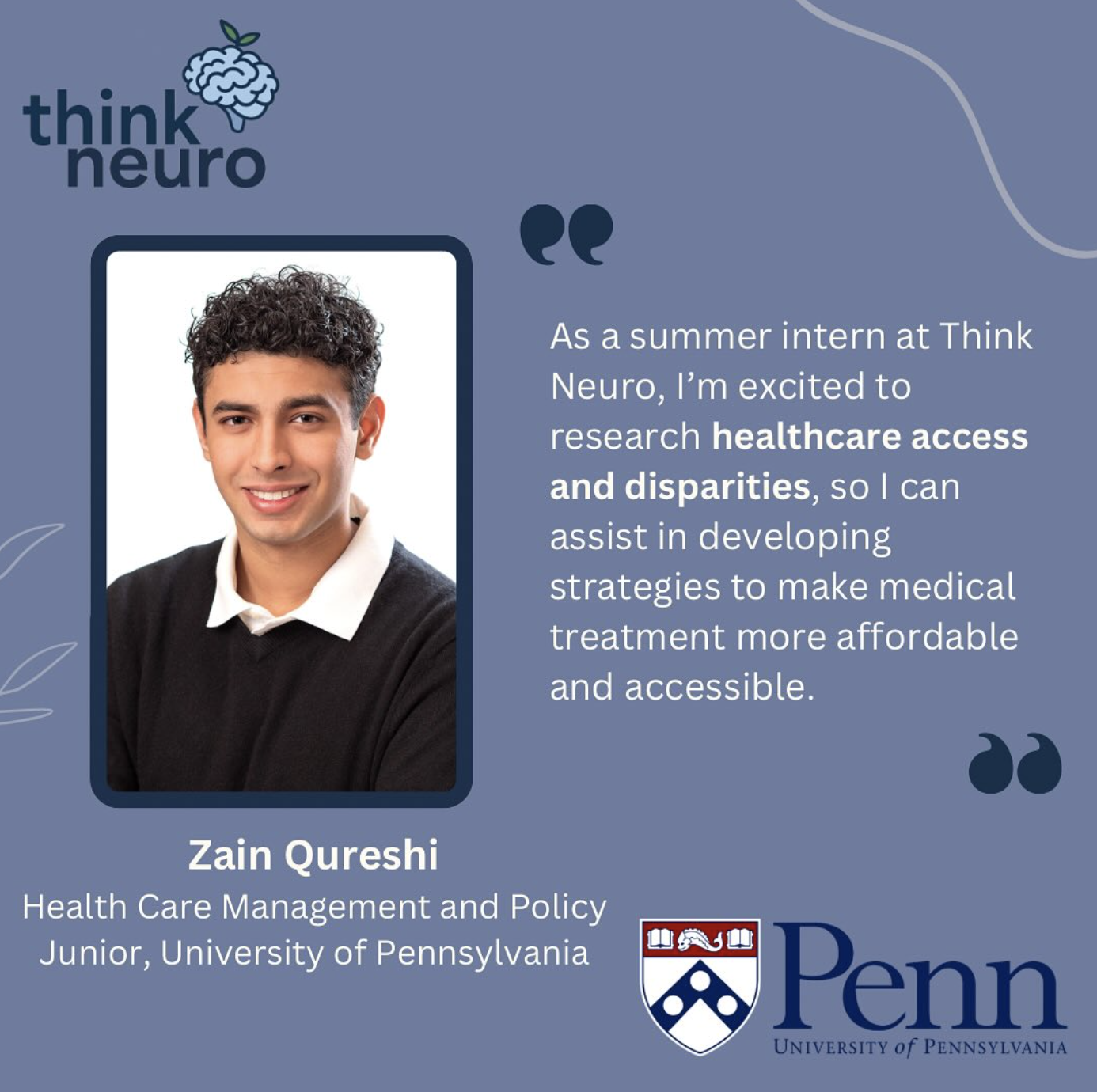BIBLIOMETRICS RESEARCH INTERNSHIP
The Bibliometrics Research Internship (BRI) is a fully remote research and certification program for ambitious high school and undergraduate students. Interns learn to conduct bibliometric analysis on topics in neuroscience, medicine, and public health using tools like R programming and Microsoft Excel. The BRI curriculum is developed under the academic guidance of faculty and physicians from Harvard Medical School, Stanford, School of Medicine and USC, whose expertise ensures the program’s rigor alignment with undergraduate-level research standards. These professors and physicians also keynote speakers and symposium judges, providing direct feedback on student research.
Interns complete the program with authorship on:
A graduate-level research abstract
A research poster and oral defense
A technical certificate recognizing their training in bibliometrics and data science
While core topics in the BRI are taught by faculty and physicians, office hours are led by ThinkNeuro project managers who answer intern questions and guide students through completing all research deliverables.
ABOUT
DELIVERABLES & OUTCOMES
SPRING 2026 FACULTY & PHYSICIAN MENTORS
Our Advisory Board includes professors, physicians, and software and machine learning engineers who guide ThinkNeuro’s academic direction and program development. The faculty and physician mentors listed below, from Harvard Medical School and Stanford School of Medicine, deliver exclusive lectures for students enrolled in the Spring Intensive.
Dr. Kaushik Venkatesh, MD, MBA, MPH
Harvard Medical School Internal Medicine
Dr. Toby Barrack, MD, MBA
Stanford School of Medicine Orthopaedic Surgery
Dr. Shriya Srinivasan, PhD
Harvard University Faculty/Professor
Dr. Kari Franson, PharmD, PhD, BCPP, FNAP
USC School of Pharmacy Faculty/Dean
ELIGIBILITY & APPLICATION CRITERIA
ThinkNeuro’s Bibliometrics Research Internship (BRI) is open to ambitious high school and undergraduate students with a passion for neuroscience. While U.S. students are given priority for admission, international applicants are also welcome to apply.
Who Should Apply: This program is ideal for students with little to no prior research experience. In fact, 57% of our interns from Fall 2025 indicated that the BRI is their first exposure to research, making it especially well-suited for:
High school students who are curious, driven, and eager to explore academic research
Undergraduates who want to build a strong foundation before joining university labs or applying to national research programs
Master’s students and recent graduates looking to gain practical experience in data analysis, research communication, or public health-related topics
We value curiosity, commitment, and independent learning more than credentials. If you're motivated to learn and excited about neuroscience, this program is built for you.
Application Process:
Submit an online application form
Admission offers are sent via email on a rolling basis
Each cohort is capped to ensure quality mentorship and small-group support
We encourage early applications, as spots are limited and tend to fill quickly.
INSIDE THE BRI CURRICULUM
Phase 1: R Programming Foundations
Interns begin by building technical fluency in R, one of the most widely used programming languages in research and data science. Through guided curriculum modules created by software engineers and taught by our in-house biostatisticians and computer scientists, students learn to:
Set up their R environment
Clean and organize data
Run bibliometric commands
Create basic visualizations (e.g., word clouds, co-authorship networks)
No prior coding experience is required, as this phase is designed to be beginner-friendly yet rigorous!
Phase 2: Bibliometric Analysis & Data Visualization
Next, interns move into the core analysis phase, where they extract real citation and authorship data from Web of Science (WoS) exports and organize it using Microsoft Excel and R. They will:
Perform keyword and citation analysis
Identify research trends and gaps
Create publication graphs, topic maps, and collaboration networks
Learn to interpret and refine bibliometric figures
This phase emphasizes bibliometric computation and modeling, transforming raw citation data into structured datasets and visual analytics.
Phase 3: Research Communication & Presentation
In the final phase, interns translate their analysis into professional research deliverables, including a graduate-level abstract, a research poster formatted for academic conferences, and an oral presentation. Interns receive mentorship on public speaking, design, and how to effectively communicate complex ideas to diverse audiences, preparing them for real-world academic and professional settings.
Many interns have gone on to submit their posters to local and national conferences with success. Their research skills and communication training developed throughout the BRI program have:
Translated into stronger college and graduate school applications.
Opened doors to research positions at local universities and further academic opportunities.
The successes of past high school and undergraduate interns are showcased in the case studies below and in the Student Outcomes tab of our website, highlighting acceptances to top universities, prestigious research programs, and lab positions at leading institutions.
TOOLS & PLATFORMS YOU'LL LEARN
Throughout the program, interns gain hands-on experience with a range of tools commonly used in academic research, data science, and presentation design:
R Programming: data cleaning, bibliometric analysis, and visualization
Web of Science (WoS): to export citation and authorship data
Microsoft Excel: to organize, structure, and sort datasets
Zotero: to manage references and citation metadata
Figma & Canva: to design clear, professional posters and presentations
These tools are introduced gradually throughout each phase of the curriculum, with beginner-friendly guidance and support from mentors through our custom-built modules, dedicated Slack channels, and live bi-weekly office hours.
Spring Intensive Founding Cohort: 50% Scholarship
To celebrate the launch of the Spring Intensive track, we are offering an 50% Founding Cohort Scholarship to applicants in the Early Decision round. A limited number of scholarships may be available for Regular Decision applicants but is not guaranteed.
| Program Track | Program Tuition | Bibliometric Analysis & Data Science Lectures |
Mode of Learning |
Certifications Offered | On-demand Mentorship | Live Office Hours |
|---|---|---|---|---|---|---|
|
Bibliometrics Research Internship |
$95 |
Six hours of lectures from ThinkNeuro project managers |
Asynchronous lectures and live group meetings |
BRI Certificate of Completion |
During abstract writing & poster creation process |
3 hours of optional office hours per week |
|
Bibliometrics Research Internship Spring Intensive |
$695 (scholarships for ED) |
Nine 1 hour lectures from Harvard Medicine and Stanford Medicine faculty and physicians |
Live lectures and live group meetings |
BRI Certificate of Completion signed by Harvard/ Stanford faculty and physicians lecturers |
During R programming and abstract writing & poster creation |
5 hours of optional office hours per week from Caltech CS mentors |
Every student’s journey into research looks a little different. Hear directly from past interns about how BRI shaped their academic goals, built their confidence, and opened new doors whether they were just starting out in high school or diving deeper as undergraduates. These stories offer a glimpse into what's possible through the program.
INTERN OUTCOMES
Shishir Tallada
Year: High School Junior Total Involvement: 2 years After ThinkNeuro: Johns Hopkins University Biomedical Engineering
Shishir joined ThinkNeuro as a high school student with no prior experience in academic research. Through his internship, he explored key topics in medicine and public health while gaining valuable mentorship and communication skills. Shishir is now attending Johns Hopkins University, where he continues to build on the foundation he developed during his time at ThinkNeuro.
Clarissa Coleman Year: High School Junior Total Involvement: 1 semester After ThinkNeuro: MIT MITES Semester Program
Clarissa joined ThinkNeuro as a high school student with no prior research experience. After completing the Bibliometrics Research Internship, she was accepted to the MITES Semester Program at MIT which is one of the nation’s most prestigious high school research programs with an acceptance rate below 2%. She also went on to secure a research position at Brown University, continuing to build on the foundation she developed through ThinkNeuro.
Four Undergraduate Voices, One Journey. This group testimonial features four undergraduate interns who joined ThinkNeuro in Summer 2025 with varying levels of prior experience.
Hanna, an incoming freshman at UC Irvine, was invited to join a brain-computer interface lab on campus after exploring the topic through ThinkNeuro. Abraham, an undergraduate at Cal Poly Pomona, will be starting a new computer science research position through his university’s STAR program this fall after his first research exposure through the BRI. Aamiya, a student at UMass Amherst, is applying her new R programming skills in a research role at her university. Syed, an undergraduate at Carnegie Mellon University, credits ThinkNeuro with giving him the confidence and foundation to pursue future research opportunities.
Watch their stories here.
Sonia Singhal Year: College Freshman Total Involvement: 1 year After ThinkNeuro: UPenn on-campus research position in a neuroscience lab
Sonia joined the BRI program in the spring of her freshman year at UPenn. Now a rising sophomore, she's returning for a second round, but this time, she’s documenting her journey. Sonia’s 6-part video series walks through each phase of the BRI experience, so future interns can get a real sense of how the program is structured.
PROGRAM ALUMNI
Applications for Spring 2026 are now open.
Spring deadline: Friday January 2nd, 2026 11:59 PM PST.
Frequently Asked Questions
-
Interns typically spend 3–5 hours per week, depending on their pace and depth of exploration. The program is designed to be flexible for students balancing school, extracurriculars, or other commitments.
-
Not at all! BRI is beginner-friendly and structured to support students with little to no prior experience. Many of our interns are exploring research for the first time.
-
Yes, the BRI is 100% online and accessible to students worldwide. All training, mentorship, and deliverables can be completed from anywhere with an internet connection.
-
Yes, interns who complete the full curriculum will receive a certificate recognizing their training in bibliometric analysis and data science.
-
The first 2–3 weeks of R programming are fully asynchronous and self-paced. After that, interns are grouped into research projects led by project associates, who host real-time meetings to support analysis and presentation development. Meeting times are coordinated based on intern availability, and recordings or alternative options are provided when possible
-
Every intern is paired with a project associate or supervisor who provides guidance, feedback, and mentorship throughout the program. You’ll also have access to custom-built modules, dedicated Slack channels, and bi-weekly live office hours led by ThinkNeuro staff.
-
Yes! Many interns have successfully submitted their BRI posters or abstracts to science fairs, conferences, and other external competitions. If you plan to do so, you must keep the ThinkNeuro trademark on your poster. We also encourage you to let your mentor know, as we’re happy to help you prepare your materials for submission.
-
The program tuition for ThinkNeuro’s Bibliometric Research Internship (BRI) is $75 for the regular track and $499 for the intensive track. This fee includes:
Lectures from senior faculty and physicians from Harvard, Stanford, and USC throughout the course of the internship (INTENSIVE ONLY).
Technical modules in R programming with curriculum designed by software engineers.
Access to ThinkNeuro’s proprietary AI research tools and API endpoints, hosted securely on our domain.
Live mentorship from our project managers throughout the abstract and poster creation process.
Symposium dues for your final oral presentation with faculty judges from Harvard, Stanford, and USC.
Program certification in bibliometric analysis.
Technical certification in R Programming (INTENSIVE ONLY).
This fee ensures that all interns have the resources, support, and technical infrastructure needed to complete the program successfully. There is no application fee, as tuition is only collected upon acceptance. -
Yes, there is a founding cohort scholarship for students who apply for the Spring Intensive Track of the BRI. To be eligible for the founding cohort scholarship, students must apply during the Early Decision round.
Interns who are unable to pay the full program fee upfront can choose Klarna at checkout through Stripe to finance their tuition. Klarna offers options like Pay in 4 interest-free installments or monthly financing, depending on your eligibility. -
We do not have fixed acceptance rates, as they vary by application cycle depending on the volume and competitiveness of the applicant pool. Some cycles, such as the Summer, receive significantly more applications than others.
Admission is based on a holistic review of your interest, commitment, and alignment with our mission. While the program is selective, it is also designed to support a diverse range of learners, especially those with limited access to traditional research opportunities, whether due to their age, educational background, or lack of prior research exposure. Historical acceptance rates have ranged between 30-60%. For acceptance statistics from a recent cohort, you can view data from Fall 2024 here. -
Yes, international students are eligible and welcome to apply. While U.S.-based students are prioritized, we regularly receive applications from students around the world.
The program is open to high school students, undergraduates, master’s students, and recent graduates who are eager to build research and data skills. All applicants are considered based on fit, interest, and capacity.











